Sorted by date Results 1 - 25 of 131
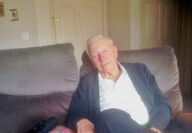
Barbara Perez, Publisher, Sun-Telegraph Edward J. Killham, 97, of Kimball, died at Kimball Health Services on Thursday, February 9, 2023. The Sun-Telegraph has chosen to honor Mr. Killham by re-printing the original article in its entirety, as it ran in our paper in 2020, writen by Larry Nelson of the Veterans History Project. Mr. Killham's obituary can be found on page 8A. Edward (Ed) Killham was a senior in high school and had earned almost all the credits required to graduate. He had learned... Full story
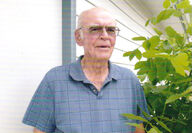
Donald L. Kizer (Don) had graduated from Julesburg High School, an 18 yr old kid, heading out into life! At the time, the United States was only five years out of World War II, American society had changed because all the “boys” had returned to the local communities, technology was changing, health care was improving, and… the drumbeats of war were starting to be heard again. The Draft system was in effect, meaning that if you hadn’t enlisted in the Armed Forces, you might be taken by the dra... Full story
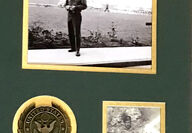
Milt Hunholtz had graduated from Diggins, Missouri High School in 1951. Fairly soon there after, he went by car to California where he would work as a telephone lineman. While there, he heard from the Draft Board in Diggins, MO. They gave him a “heads up” that it was more than likely he was going to be drafted into one of the Branches of military service. There was a lot going on in the world at the time. He may soon be a part of it… Milt headed back to Missouri. Draft officials said he had t...
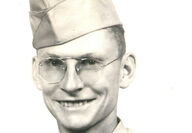
This story is reprinted from 2017 in recognition of Ernest Kahrs' passing. Ernest Kahrs graduated from high school in Lodgepole in 1949. By that time, there were several branches of the military he could have joined. The U.S. Air Force had become an entity of its own; the U.S. Navy was hiring young folks; the Marines were always interested. Ernest just waited for the draft to come get him. The government did just that. The action that drove his being drafted was the conflict in Korea. (Note: if...
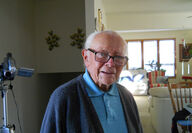
This story is reprinted in memory of Vincent Havorka who died Jan. 25, 2022, at the age of 99. “Go west, young man” must have been ringing in the ears of Vincent Havorka (Vince). After graduating from high school in northeastern Nebraska, he made his way to California. It was late in 1940. He looked for jobs and found a good one with Lockheed Aircraft in Burbank, CA. Vince liked his work there where he worked on assembling the P-38 and 414 Hudson Bombers. He developed some metal-smithing ski...
Paul Roberts was a college student at Wayne State University in Wayne, Nebraska. When not in classes, he would return home to Albion, Nebraska to help with his dad’s plumbing business. He was also an athlete who could run. At the end of three college semesters, he had sustained a knee injury which hampered his running ability. At about the same time, the Selective Service Board had sent him a draft notice. Before going right into the service, he was involved in an automobile injury accident. The Selective Service people allowed him 6 months t...
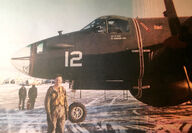
When America’s politicians and military leaders took a break between ending the war in Korea and officially admitting involvement in Vietnam, a good deal of military work continued around the world. Surely, many men began covert and assisting assignments in Southeast Asia. Others continued careers in the US and beyond. Steven A. Green spent his young and growing years in Aurora, Neb. In that there aren’t a lot of lakes around Aurora, he still liked being around water. He loved watching the air...
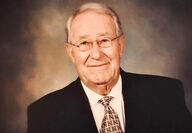
Thomas (Tom) Kokjer spent a lot of his early years working in the repair and sales offices of Kokjer Motors in Sidney, NE. He probably didn’t think that was so important when he was twelve years old, but it was. As he grew up, he learned to work on engines. He could take them apart, fixed them, and made them work again. When he was in his mid-teens, he knew the Country was at war, and that the war was being waged on a couple of fronts. His father was a pilot in WWI. His older brother had s...
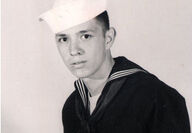
This story is being reprinted from the Aug. 27, 2014 edition of the Sun-Telegraph in recognition of Rudy Virgil's passing. Traveling south on 11th Avenue in Sidney is a restaurant that sits just north of the First Methodist Church and across the street from the bowling alley. The workers at "Virgil's" maintain a low profile while serving up a lot of good food. The owner, Rudy L. Virgil, is a veteran of the U.S. Navy. He served from April 1957 to May 196 and again from April 1967 to May 1971. Rud...
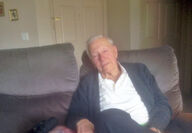
Edward (Ed) Killham was a senior in high school and had earned almost all the credits required to graduate. He had learned about an aviation school he could attend that paid $100 a month. The school was in Denver, CO. After a few months of training in Denver, some of the students, including Ed, were sent to an Army-Air Forces base (Hill AFB) near Ogden, Utah. Continuing his training, Ed worked there until about June 1943. He had learned something about airplanes, was housed, fed and had a...
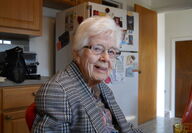
Dorothy and Cecil Holloway were a married couple before World War II began. Cecil was quite a pilot and had joined the Navy. His talent for airplanes was put to use quickly. He became an instructor pilot and he and his wife Dorothy moved about the United States so he could use his skills for the country's benefit. Cecil's health became an issue early on. To best get him the medical attention that was needed, he was sent to Naval Air Station Jacksonville, Florida. In addition to being a major...
By the time Joan Fowler-Hughes was 21 years old, she had graduated from high school as well as college. She was seriously involved with a man who was a college graduate as well as a pilot… and deployed to the theater of war in Europe. The man was killed in action. Joan was grief-stricken. The best thing she felt she could to do keep his memory alive was to try to take his place in service to the country. Joan and a college friend decided to join the ranks of the Navy’s WAVES (Women Accepted for Volunteer Emergency Service). The WAVES were est...
National Law Enforcement Memorial Week brings serious thoughts to American citizens who remember the loss of those elected or charged to protect and serve. There are ceremonies all across the country with higher ranking officials talking about service and commitment. At Washington D.C., the National Law Enforcement Officers Memorial is resplendent with memorabilia and care. Many law enforcement agencies send a representative to the Nation’s Capitol to be a part of the program. There are car doors from law enforcement vehicles, each signed with...
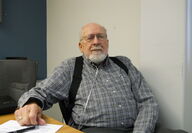
t was a round-about route to get into the military for William O. (Bill) Graves. At age 20 he was drafted by the Selective Service Board in Southern Illinois. He went to St. Louis, Missouri for the physical and other testing. He returned home for a short time. He went back to St. Louis to board a troop train that took lots of young men in a similar situation, to Battle Creek, Michigan. When leaving St. Louis, Bill had worn street clothes and a windbreaker. Arriving at Battle Creek, the...
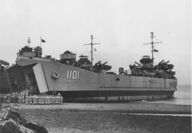
Robert Palmer's dad made Robert promise to finish high school before he went into the Navy. The dad, a WWI sailor, knew that if his son went off to the Navy, he would never finish high school. Robert (Bob) went to the school principal and talked with him about his status and when he could graduate? The Principal told Bob he had plenty of credits then to graduate. Bob relayed that information to his dad, who confirmed it, and the dad signed the papers allowing the 17-year-old to join the US...
Thomas J. Roberts (Tom) had graduated from High School in Burlington, Wisconsin in 1967. He was trying to learn the trade of being a printer and working with photography. He was working for the people who managed the Burlington newspaper and had been with the firm over two years. Tom was a serious minded young man who had a solid spiritual core. For some time he had some thoughts of entering a monastery order but concluded that it might appear to some that he was motivated by a desire to sidestep military duty. Though deeply troubled by many...
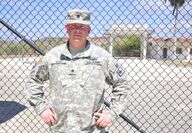
Samuel House (Sam) is from Tilden, Nebraska. Sam wanted to be in the U.S. Army. He had researched some items that might be in his future, including joining early. He learned that the National Guard had an option that appealed to him. It was called the split-option enlistment. On completion of his junior year in high school, he could go to basic training and complete it during the summer. After graduating high school, he could resume active duty and complete his advanced training. Sam took...
Ernest Kahrs graduated from high school in Lodgepole in 1949. By that time, there were several branches of the military he could have joined. The U.S. Air Force had become an entity of its own; the U.S. Navy was hiring young folks; the Marines were always interested. Ernest just waited for the draft to come get him. The government did just that. The action that drove his being drafted was the conflict in Korea. (Note: if one was in the fight there, it was the Korean War. If one wasn’t there, it was called a “conflict”). Ernest rode a train...
In May 1964, Beverly Webb graduated from Sheridan, Wyoming High School. The following month, she enlisted in the United States Army. She knew that she wanted to get as much schooling in accounting as she could get. The Army offered her some great training and a skill. “Sign me up!” At that time, female enlistees had to be twenty-one years old to enlist without parental permission, but her parents signed on saying the Army had their permission to train their daughter. The U.S. Marines and the U.S. Navy were also interested in this prospect bec...
Having a Grandfather who was a Seabee in WWII - who was a Prisoner of War - and a father who served in the US Marine Corps, Karleta A. Wheat (Karla) wanted to serve her Country. At this stage in her life, she was 28 years old, a married woman and mother of two young girls. Her husband had served in an Army Reserve unit and understood her drive to serve. Karla tested out just fine and learned that one of the critical personnel needs the Army had was in the field of postal service. There was an Army Reserve unit nearby in Oklahoma City. She...
Registering for the Selective Service was mandatory in the 1940s. Once signed in, a young man was subject to being called up for service just about anytime armed forces were in need. When he reached eighteen, Earl Foster was all set to go into the Army as a draftee. Earl’s older brother Lee had already had a year in college. The Foster brothers just knew one of them was going to war. They decided that Lee would enlist while Earl stayed back to help with running the family farm near York. When WWII ended, the Draft Board relaxed a little… by...
A new wing at the Veterans Affairs Medical Center in Cheyenne, Wyoming is called the Psycho-social Residential Rehabilitation Treatment Program (PRRTP). In awareness of problems from Traumatic Brain Injury (TBI), and Post-Traumatic Stress Disorder (PTSD), the trained personnel in this unit work hard to re-center the focus of those returning from combat to being able to deal with civilian life. Many of those coming back from combat face very difficult adjustments. They have lived in an environment of extreme stress. In current combat, there is...
Lee R. Foster had obtained a year of college at the University of Nebraska in the early 40s. He recalled that when the bombing at Pearl Harbor was going on, he was waiting tables at the women’s prison. His brother received a college scholarship the next year so Lee returned to the family farm while the brother took advantage of the scholarship. In the early part of 1943, Lee and his brother knew one of them was going to have to serve in the Armed Forces. Lee applied for voluntary induction in York. For the physical exam, he had to go to Fort C...
Richard Sherard joined the United States Marine Corps before graduating from high school in Cheyenne, Wyoming. He had relatives who had been in the US Army and in the USMC. His thought was that if he had to go to war, he wanted to get the best training available. In August of 1981, he left the comforts of home and made his way to San Diego, California, then to Marine Corps Recruit Depot (MCRD). Even with a night arrival, a greeting committee met this young man and others . Their loud voices, constant belittling, and presentations of “I’m the...
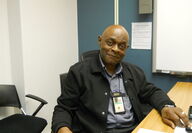
F loyd Watson Jr. came from a family consisting of his parents and six children. The family lived in Durham, North Carolina. Floyd was an athlete in his high school years (football and track) and went on to college to learn and to play football. College life was good and going as planned until Floyd was injured. Dang! Floyd had considered going into the military and was kinda checking it out, then on an impulse, he went into the Air Force recruiter's office in Durham. The recruiter provided...